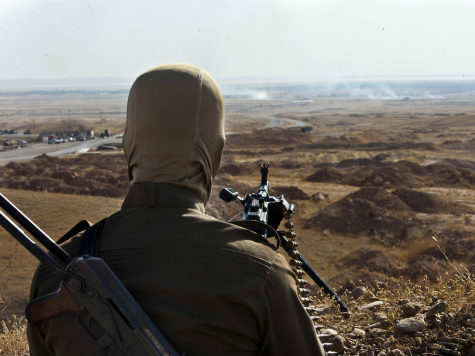
The Islamic State of Syria and Sham (ISIS) and their Sunni tribal allies reached the strategic Mahmudiyah district southwest of Baghdad in large numbers on June 26th.
Kurdish officials said that militants had seized the towns of Iskandariyah and Mahmudiyah. The depleted Iraqi Army 17th Division is still fighting in the area, but it lacks air support and armored vehicles. Since Mahmudiyah district controls the key supply routes linking Baghdad with the Shiite majority in the south, more Iraqi Army units will have to be pulled back from fighting in the north.
According to reports by Stratfor Global Intelligence, unnamed Iraqi defense officials admit that seven divisions, half of the Iraqi army prior to the fall of Mosul, have been defeated or given up the fight. Large numbers of mostly Shiite Muslims have volunteered, but they lack training and experience.
The military situation up Route 1 along the Tigris River looks as follows:
- The Iraqi army is entrenched around the Shite Holy City of Samarra, but its forces are composed mostly of inexperienced volunteers. It would be difficult for the central government to stage a rapid counterattack against Sunni-dominated tribes that are allied with experienced Baathist Party military leaders that were banned from the Iraqi Army after the 2003 fall of Saddam Hussein.
- The fight for the Baiji refinery is reportedly being spearheaded by highly-trained Iraqi Special Operations Forces, but they only have limited numbers. Reinforcements had been moved in by helicopter, but with Sunni rebel forces approaching Baghdad from the west and southwest, the Iraqi government will probably have to divert Special Forces south.
- The Iraqi highly advertised impending “big push” north from Samarra to relieve Baiji seems to have evaporated.
Stratfor believes that the Iraqi Army will have to increasingly rely on outside powers, such as Iran and the United States, as well as Shiite militias such as the al-Sadr movement, for aid. This dependence on Iranian and Shiite militias will worsen sectarian tensions and make it increasingly difficult for the central government to court ambivalent Sunni tribes in efforts to turn them against ISIS.
Baghdad is being heavily defended by the Iraqi security forces at this time. But ISIS militants are increasingly able to use significant terrorist tradecraft to stage bombings, assassinations, and assaults in the city. These range from large vehicle-borne improvised explosive devices to suicide squad tactics similar to those used effectively by the Taliban to try to destabilize Kabul over the last few years.
The Islamic State in Iraq and Sham is coordinating a staged, three-pronged attack on the Balad Air Base (formerly known as Camp Anaconda) about 35 miles north of Baghdad. ISIS appears to have overrun a portion of the facility. By attacking the base, ISIS prevents the Iraqi army from using it as a forward operating base to support Iraq’s limited number of attack helicopters stationed at Taji Air Base near Baghdad.
The main reason that the Iraqi forces have collapsed so fast is the country has no front-line fighter jets or attack helicopters capable of using precision munitions. Two U.S.-led invasions and a no-fly zone over most of Iraq eliminated the majority of Iraq’s Air Force that had once been one of the strongest in the region. Iraq has 36 F-16Q fighter jets on order and was supposed to receive its first four by late 2014.
With ISIS in the suburbs of Baghdad, it seems likely that Iraq will cease to be a nation unless heavy outside support comes to its rescue. Syria has begun bombing ISIS targets in Western Iraq, but lack of aerial tankers will prevent this intervention from changing the military situation in central Iraq. To survive, Iraq seems to need the immediate intervention by fighter jets and attack helicopters from the United States, Iran or possibly both.
The author welcomes feedback and will respond to reader comments.

COMMENTS
Please let us know if you're having issues with commenting.